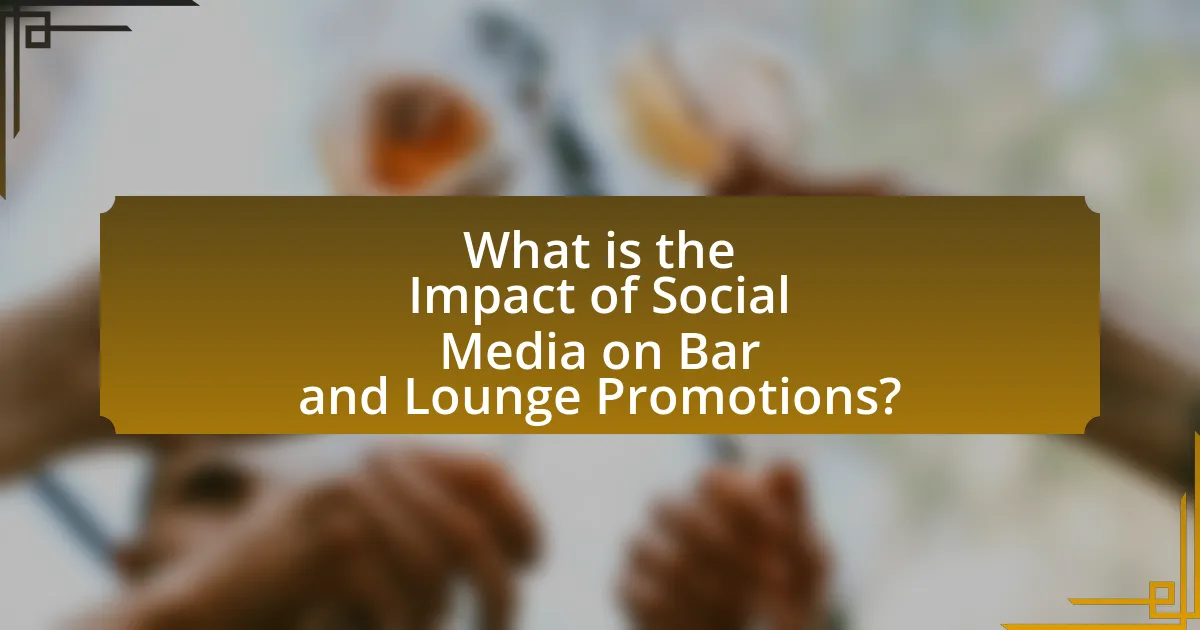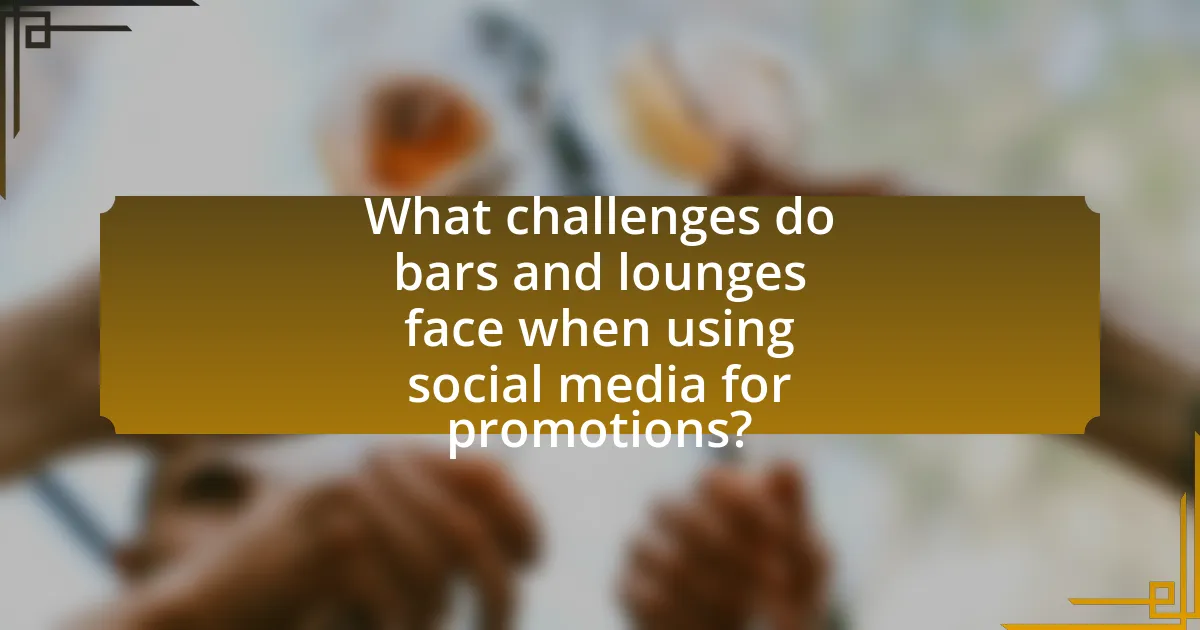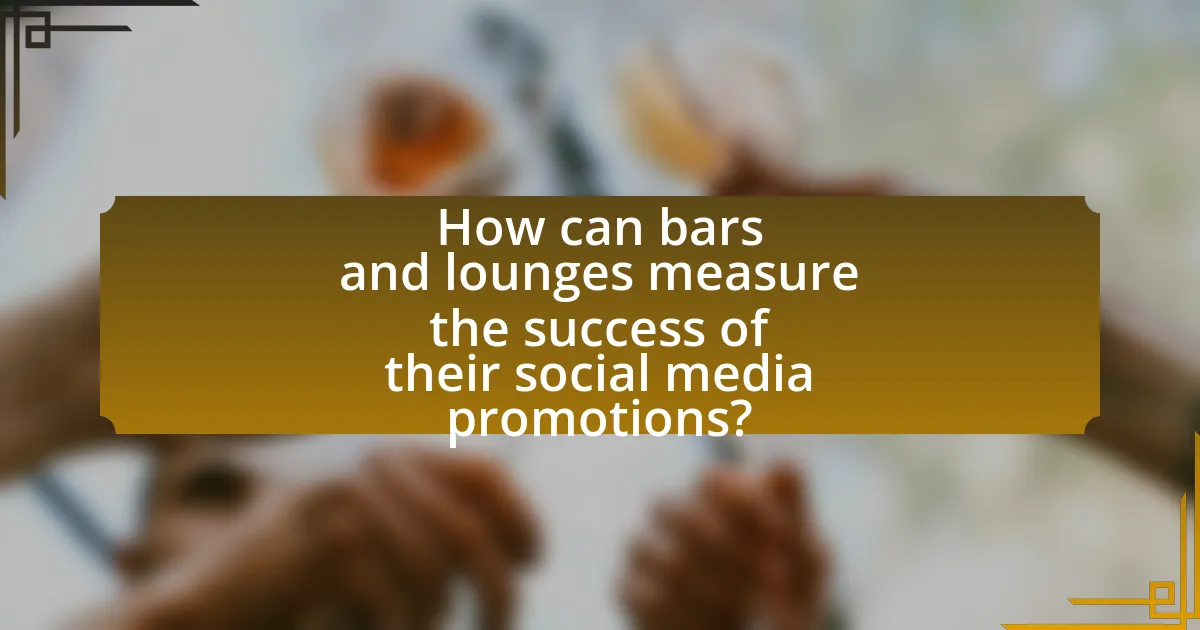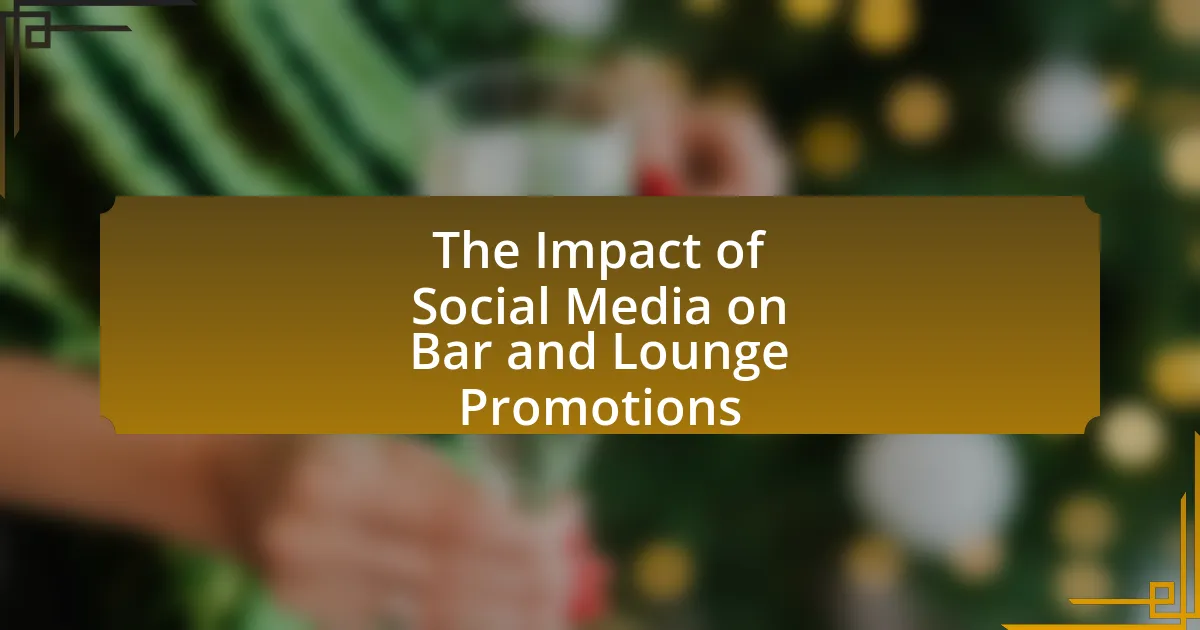The article examines the significant impact of social media on bar and lounge promotions, highlighting how platforms like Instagram, Facebook, and TikTok enhance visibility and customer engagement. It discusses the transformation of traditional marketing strategies through direct customer interaction, targeted advertising, and the influence of user-generated content. Key benefits of social media for these establishments include increased brand awareness, community building, and improved customer loyalty. Additionally, the article addresses challenges such as competition for attention and algorithm changes, while offering best practices for effective promotions and strategies to measure success. Emerging trends and technologies are also explored, emphasizing the need for bars and lounges to adapt to evolving consumer behaviors in their social media strategies.

What is the Impact of Social Media on Bar and Lounge Promotions?
Social media significantly enhances bar and lounge promotions by increasing visibility and engagement with potential customers. Platforms like Instagram and Facebook allow bars and lounges to showcase their offerings, events, and ambiance, reaching a broader audience. According to a study by the National Restaurant Association, 70% of consumers are influenced by social media when deciding where to dine or drink. This influence translates into higher foot traffic and sales for establishments that effectively utilize social media marketing strategies. Additionally, user-generated content, such as customer reviews and photos, further amplifies promotional efforts, creating a sense of community and trust around the brand.
How has social media transformed traditional bar and lounge marketing strategies?
Social media has transformed traditional bar and lounge marketing strategies by enabling direct engagement with customers and facilitating targeted advertising. This shift allows bars and lounges to reach specific demographics through platforms like Instagram and Facebook, where visual content can showcase ambiance, events, and promotions effectively. For instance, a study by the Pew Research Center indicates that 69% of adults in the U.S. use social media, providing bars and lounges with a vast audience to engage with. Additionally, social media allows for real-time feedback and interaction, fostering community and loyalty among patrons, which traditional marketing methods could not achieve as effectively.
What are the key social media platforms influencing bar and lounge promotions?
The key social media platforms influencing bar and lounge promotions are Instagram, Facebook, and TikTok. Instagram is particularly effective due to its visual nature, allowing bars and lounges to showcase their ambiance, drinks, and events through high-quality images and stories, which can lead to increased customer engagement. Facebook serves as a platform for event promotion and community building, enabling venues to create events, share updates, and interact with patrons. TikTok has emerged as a powerful tool for viral marketing, where creative short videos can quickly capture the attention of a younger audience, driving foot traffic to bars and lounges. These platforms collectively enhance visibility and engagement, making them essential for effective promotions in the hospitality industry.
How do consumer behaviors on social media affect promotional strategies?
Consumer behaviors on social media significantly influence promotional strategies by shaping how businesses engage with their target audience. For instance, the rise of user-generated content and peer recommendations on platforms like Instagram and Facebook has led bars and lounges to prioritize influencer partnerships and customer testimonials in their marketing efforts. According to a study by Nielsen, 92% of consumers trust recommendations from friends and family over any other form of advertising, prompting businesses to leverage social proof in their promotions. Additionally, real-time feedback and engagement metrics from social media allow bars and lounges to tailor their promotional strategies dynamically, ensuring they resonate with current consumer preferences and trends.
What are the benefits of using social media for bar and lounge promotions?
Using social media for bar and lounge promotions offers significant benefits, including increased visibility, customer engagement, and targeted advertising. Social media platforms allow bars and lounges to reach a wider audience, with 4.7 billion active social media users globally as of 2023, enhancing brand awareness. Additionally, these platforms facilitate direct interaction with customers, enabling businesses to gather feedback and foster community, which can lead to increased customer loyalty. Targeted advertising on social media allows bars and lounges to reach specific demographics, optimizing marketing budgets and improving conversion rates. According to a study by Hootsuite, businesses that engage with customers on social media see a 20-40% increase in customer retention.
How does social media enhance customer engagement for bars and lounges?
Social media enhances customer engagement for bars and lounges by providing platforms for direct interaction, real-time feedback, and targeted promotions. These platforms allow bars and lounges to share updates, events, and special offers, fostering a sense of community and encouraging customer participation. For instance, a study by Sprout Social found that 64% of consumers want brands to connect with them on social media, indicating that engagement through these channels can lead to increased customer loyalty and foot traffic. Additionally, user-generated content, such as photos and reviews shared by patrons, serves as authentic endorsements that attract new customers and enhance the venue’s reputation.
What role does social media play in building brand loyalty for bars and lounges?
Social media plays a crucial role in building brand loyalty for bars and lounges by facilitating direct engagement with customers and creating a community around the brand. Through platforms like Instagram and Facebook, bars and lounges can share promotions, events, and user-generated content, which fosters a sense of belonging among patrons. Research indicates that 71% of consumers who have a positive experience with a brand on social media are likely to recommend it to others, enhancing brand loyalty. Additionally, social media allows for real-time feedback and interaction, enabling bars and lounges to respond to customer needs and preferences promptly, further solidifying loyalty.

What challenges do bars and lounges face when using social media for promotions?
Bars and lounges face several challenges when using social media for promotions, including competition for attention, maintaining brand consistency, and navigating platform algorithms. The high volume of content on social media makes it difficult for bars and lounges to stand out, as they compete with numerous other businesses for user engagement. Additionally, ensuring that promotional content aligns with the brand’s identity can be challenging, as inconsistent messaging may confuse potential customers. Furthermore, social media platforms frequently update their algorithms, which can affect the visibility of posts, making it harder for bars and lounges to reach their target audience effectively. These challenges highlight the complexities involved in leveraging social media for successful promotional strategies.
How can bars and lounges overcome negative feedback on social media?
Bars and lounges can overcome negative feedback on social media by actively engaging with customers, addressing concerns promptly, and implementing changes based on feedback. Engaging with customers involves responding to comments and messages, which shows that the establishment values customer opinions. Addressing concerns promptly can mitigate damage; for instance, a study by Sprout Social found that 70% of consumers are more likely to recommend a brand that responds to their feedback. Implementing changes based on feedback demonstrates a commitment to improvement, which can enhance customer loyalty and attract new patrons.
What strategies can be implemented to manage online reputation effectively?
To manage online reputation effectively, businesses should implement proactive monitoring, engage with customers, and respond promptly to feedback. Proactive monitoring involves using tools like Google Alerts and social media listening platforms to track mentions of the brand, allowing for timely intervention when negative comments arise. Engaging with customers through social media and review platforms fosters a positive relationship and demonstrates that the business values feedback. Additionally, responding promptly to both positive and negative reviews can mitigate damage and enhance customer loyalty. Research indicates that 70% of consumers are more likely to use a business that responds to reviews, highlighting the importance of active engagement in reputation management.
How do algorithm changes on social media platforms impact promotional reach?
Algorithm changes on social media platforms significantly reduce or enhance promotional reach for businesses. These changes often prioritize content based on user engagement metrics, which can lead to decreased visibility for promotional posts if they do not resonate with the audience. For instance, Facebook’s algorithm updates in 2018 shifted focus towards posts from friends and family over business pages, resulting in a reported 50% drop in organic reach for many brands. Consequently, businesses must adapt their strategies to align with these algorithmic preferences, often requiring increased investment in paid promotions to maintain visibility.
What are the best practices for effective social media promotions in bars and lounges?
The best practices for effective social media promotions in bars and lounges include creating engaging content, utilizing targeted advertising, and fostering community interaction. Engaging content, such as high-quality images of drinks and events, can attract attention and encourage sharing, which is crucial for organic reach. Targeted advertising allows bars and lounges to reach specific demographics, increasing the likelihood of attracting potential customers. Additionally, fostering community interaction through responding to comments and hosting social media contests can enhance customer loyalty and engagement. According to a study by Sprout Social, 70% of consumers feel more connected to brands with which they can interact on social media, highlighting the importance of community engagement in promotions.
How can bars and lounges create engaging content for their social media audiences?
Bars and lounges can create engaging content for their social media audiences by showcasing unique drink recipes, hosting live events, and sharing customer experiences. By posting visually appealing images and videos of signature cocktails or themed nights, establishments can attract attention and encourage sharing. Additionally, interactive content such as polls, contests, and user-generated content can foster community engagement. According to a study by Sprout Social, posts with images receive 650% higher engagement than text-only posts, highlighting the importance of visual content in social media strategies for bars and lounges.
What types of promotions work best on social media for bars and lounges?
Promotions that work best on social media for bars and lounges include limited-time offers, event promotions, and user-generated content campaigns. Limited-time offers, such as happy hour specials or discounts on specific nights, create urgency and encourage immediate visits. Event promotions, like themed nights or live music events, attract attention and can be shared widely, increasing reach. User-generated content campaigns, where patrons share their experiences or photos, enhance engagement and build community, as evidenced by a study from Sprout Social showing that 79% of consumers prefer user-generated content over brand-created content. These strategies effectively leverage social media’s interactive nature to drive foot traffic and enhance brand visibility.

How can bars and lounges measure the success of their social media promotions?
Bars and lounges can measure the success of their social media promotions through metrics such as engagement rates, conversion rates, and customer feedback. Engagement rates, including likes, shares, and comments, indicate how well the content resonates with the audience. Conversion rates, which track the number of users who take a desired action (like making a reservation or attending an event), provide insight into the effectiveness of the promotion. Additionally, customer feedback, gathered through surveys or direct messages, offers qualitative data on customer satisfaction and the perceived value of the promotions. These metrics collectively help bars and lounges assess the impact of their social media strategies on customer engagement and sales.
What metrics should bars and lounges track to evaluate social media effectiveness?
Bars and lounges should track engagement rate, reach, follower growth, and conversion rate to evaluate social media effectiveness. Engagement rate measures interactions (likes, comments, shares) relative to total followers, indicating content resonance. Reach quantifies the number of unique users who see posts, reflecting brand visibility. Follower growth tracks the increase in audience size, showing overall interest and potential customer base expansion. Conversion rate assesses the percentage of social media interactions that lead to desired actions, such as reservations or event attendance, demonstrating the effectiveness of promotional efforts. These metrics provide a comprehensive view of social media performance and its impact on business outcomes.
How can customer feedback be utilized to improve social media strategies?
Customer feedback can be utilized to improve social media strategies by analyzing insights to tailor content and engagement approaches. By systematically collecting and evaluating feedback through surveys, comments, and direct messages, businesses can identify customer preferences, pain points, and trending topics. For instance, a study by Sprout Social found that 70% of consumers are more likely to engage with brands that respond to their feedback on social media. This indicates that addressing customer concerns and preferences can enhance brand loyalty and engagement. Additionally, leveraging positive feedback in promotional content can attract new customers, while addressing negative feedback can mitigate potential reputational damage.
What tools are available for analyzing social media performance in the bar and lounge industry?
Tools available for analyzing social media performance in the bar and lounge industry include Hootsuite, Sprout Social, and Google Analytics. Hootsuite allows users to track engagement metrics across multiple platforms, providing insights into audience interactions and content performance. Sprout Social offers detailed analytics on social media campaigns, including demographic data and engagement rates, which are crucial for understanding customer preferences in the bar and lounge sector. Google Analytics can track referral traffic from social media to a bar or lounge’s website, helping to measure the effectiveness of social media promotions. These tools are widely used in the industry to optimize marketing strategies and enhance customer engagement.
What future trends should bars and lounges anticipate in social media promotions?
Bars and lounges should anticipate increased personalization and interactive content in social media promotions. As consumer preferences evolve, leveraging data analytics to create tailored experiences will become essential. For instance, platforms like Instagram and TikTok are increasingly favoring content that engages users through polls, quizzes, and live interactions, which can enhance customer loyalty and drive foot traffic. According to a 2022 Sprout Social report, 70% of consumers prefer brands that personalize their social media interactions, indicating a clear trend towards customized engagement strategies.
How might emerging technologies influence social media marketing for bars and lounges?
Emerging technologies will significantly enhance social media marketing for bars and lounges by enabling more personalized and interactive customer experiences. For instance, the integration of artificial intelligence can analyze customer preferences and behaviors, allowing bars and lounges to tailor their promotions and content to specific audiences, thereby increasing engagement. Additionally, augmented reality (AR) can create immersive experiences, such as virtual tours of the venue or interactive drink menus, which can be shared on social media platforms, attracting more customers. According to a report by Statista, 54% of social media users express interest in AR experiences, indicating a strong potential for bars and lounges to leverage this technology for marketing purposes.
What shifts in consumer behavior should bars and lounges prepare for in their social media strategies?
Bars and lounges should prepare for a shift towards increased consumer demand for authentic and personalized experiences on social media. This shift is driven by consumers seeking genuine connections and unique offerings, as evidenced by a 2022 survey from Sprout Social, which found that 70% of consumers prefer brands that engage with them in a personalized manner. Additionally, the rise of user-generated content indicates that consumers are more likely to trust peer recommendations over traditional advertising, with 79% of people saying user-generated content highly impacts their purchasing decisions, according to a report by Nielsen. Therefore, bars and lounges must adapt their social media strategies to focus on community engagement, showcasing real customer experiences, and fostering a sense of belonging among their audience.
What practical tips can bars and lounges implement for successful social media promotions?
Bars and lounges can implement several practical tips for successful social media promotions, including creating engaging content, utilizing targeted advertising, and collaborating with influencers. Engaging content, such as high-quality images and videos of drinks and events, can attract attention and encourage sharing, which is crucial for organic reach. Targeted advertising allows bars and lounges to reach specific demographics, increasing the likelihood of attracting potential customers; for instance, Facebook Ads can be tailored to local audiences based on interests and behaviors. Collaborating with local influencers can enhance credibility and expand reach, as influencers often have established trust with their followers, leading to higher engagement rates. These strategies are supported by data showing that visual content is 40 times more likely to be shared on social media, and targeted ads can yield a return on investment of up to 400%.
